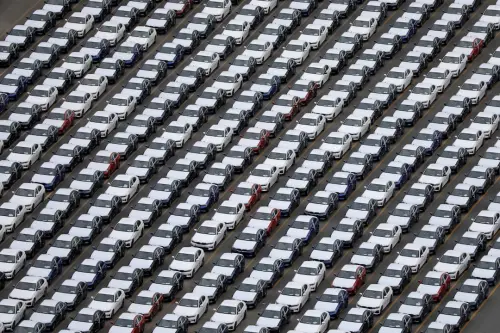U.S. President Donald Trump announced that automobile tariffs will be implemented soon, though not all of the threatened levies will take effect on April 2, and some countries may receive exemptions. This indication of flexibility has been perceived positively by Wall Street, which has been unsettled by trade tensions for weeks.
In a further escalation of the global trade conflict, Trump imposed a 25% secondary tariff on any country importing oil or gas from Venezuela, causing an increase in oil prices.
At a press briefing, Trump mentioned that not all new tariffs would be unveiled on April 2 and suggested that "many countries" could receive breaks, without providing specific details. A White House official noted that the timing for sector-specific tariffs on automobiles, pharmaceuticals, or semiconductor chips is still to be decided and ultimately at the president’s discretion.
The official warned against expecting tariff relief, emphasizing the president's commitment to implementing strong reciprocal tariffs. Reports indicated that the administration is refining its approach to the variety of levies Trump has discussed for April 2, potentially delaying some sector-specific tariffs.
U.S. markets closed broadly higher amid optimism that the upcoming tariffs may be less extensive than previously anticipated, with the S&P 500 gaining nearly 1.8%, reaching its highest level in over two weeks.
Trump stated that the U.S. would soon impose tariffs on autos, pharmaceuticals, and aluminum, asserting that these products would be necessary in times of conflict or crisis. He mentioned that auto tariffs would be announced within days, with additional tariffs on lumber and semiconductor chips to follow later.
Following a cabinet meeting, Trump claimed that the anticipated tariffs would generate significant revenue for the U.S., allowing for lower tax rates. He reiterated that countries could avoid these tariffs by reducing their own tariffs or relocating manufacturing to the U.S.
Additionally, Trump disclosed Hyundai Motor Group's plans to invest in the U.S., which includes a $5.8 billion steel plant in Louisiana, announced during a White House event with Hyundai Chairman Euisun Chung and Louisiana Governor Jeff Landry.
Trump characterized the April 2 tariffs as a "Liberation Day," aimed at reducing a $1.2 trillion global goods trade deficit by increasing U.S. tariffs to levels comparable to those charged by other countries.
In February, Trump hinted at imposing auto tariffs of "around 25%" and similar duties on semiconductors and pharmaceuticals, though he later agreed to some exemptions for autos after negotiations.
Since his inauguration, Trump’s aggressive tariff policy has been marked by a series of threats, reversals, and delays, often occurring just hours before deadlines as his trade team rapidly formulates new policies.
He has already introduced a 20% tariff on Chinese imports, reinstated 25% tariffs on global steel and aluminum, and applied 25% tariffs on imports from Canada and Mexico that do not comply with North American trade agreements related to the U.S. fentanyl crisis.
Two senior officials have indicated that the focus of the April 2 tariffs will be a more limited group of countries with significant trade surpluses and high non-tariff barriers. They referred to these countries as the "Dirty 15," acknowledging ongoing concerns about exemptions.
A former senior U.S. Commerce Department official suggested that regardless of whether sectoral tariffs are imposed on April 2 or later, the administration will continue to pursue aggressive Section 232 investigations. Some countries, such as the UK and India, are actively seeking discussions with the White House in an effort to avoid tariffs.
In a recent communication regarding reciprocal tariffs, the Office of the United States Trade Representative expressed interest in submissions from major U.S. trade partners and those with significant trade surpluses.
Trump also announced that any country purchasing oil from Venezuela will incur a 25% tariff on trades with the United States, effective April 2. He highlighted concerns over violence associated with Venezuelan migrants entering the U.S.
